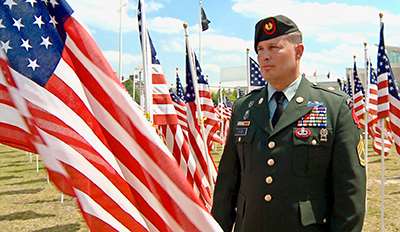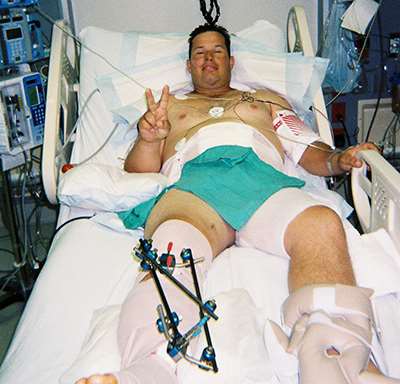
“I’m not a hero,” said former Special Forces Sergeant 1st Class Greg Stube. He carefully sipped from the first beer he’d tasted since spending a year recovering in a hospital from wounds received on a battlefield in Afghanistan. After a long pull, he said, “No, I’m just a patriot.”
As I sat across a table from him in a pub in Washington, D.C., I wasn’t so sure. Stube had been blown apart while attempting to save a man he didn’t know, a man fighting for another country’s army. He’d volunteered to risk his life to free a nation and to destroy a terrorist movement, the great evil that crashed planes loaded with Americans into the World Trade Center, the Pentagon and, while American heroes struggled to take the cockpit, a farm field in Pennsylvania. I’d been in audiences where Stube gave speeches that pragmatically outlined the noble traits a man should struggle to embody—showing he philosophically understands why he chose to fight. He volunteers a considerable amount of time to help wounded veterans readjust to American civilian life. So I vexed, if not this man, then can anyone be a living hero in this cynical, realist age?
Over the next decade, I would get to know this patriot who said he wasn’t a hero. I would hear him speak to many more large audiences about our freedom and, at some point in every speech, he would always tell them not to let the freedom we have here, particularly our right to keep and bear arms, slip away, as he’d seen firsthand what happens to disarmed peoples.

Still, even after helping Greg put together his book, Conquer Anything—A Green Beret’s Guide to Building Your A-Team, I find it hard to sum him up. He is one of those people who gives all of himself to his audiences and in the pages of his fine book, but who, as you get to know him, simply keeps receding as he shows you new depths beneath his earned perspective.
Perhaps that is what makes great men and women great. They are open, honest, purely what they seem, but forever full of enticing mystery about things we want to know more of, but that we just haven’t earned in the way they have. As a result, they seem forever on a distant plain urging us on toward their example.
Such is Greg Stube. And, as Memorial Day is this month, it is time to ask him a few important questions about how he now views American freedom.
A1F: You are a country boy who grew up shooting and hunting. You once told me, “the Special Forces are in the business of creating country boys,” so I am wondering, looking back, if this is still the way you feel about it.
Stube: Yes. Training multi-cultural troops to become Special Ops Warriors is a lot like turning all of them into “country boys.” Shooting, hunting and other outdoor competencies make many aspects of this type of training easier. Learning early in life about shooting develops acute awareness of safety, to a degree that many don’t encounter in a life without it. Employing weapon systems of all kinds requires a feel for effective trajectories and an understanding for what projectiles effectively do. This is an area that’s difficult to master without practical experience, so someone who has this experience from their youth is far ahead of their peers.
Hunting takes that to yet another level. What it takes to be stealthy enough in the environment to get within range of a game species can be daunting. Overcoming terrain, water, vegetation or even open space, while remaining outside your quarry’s perception is challenging enough, but then you must understand the effective range of your weapon and get within your own ability to employ it. Placing an accurate and effective shot in such variable conditions, while you may be fatigued or winded, is a test. Compare that to what a warfighter is called upon to do, and the correlation becomes clear.
A1F: You went overseas and fought, and nearly died, for American freedom, so what’s it like to see our freedom so misunderstood and mistreated by the mainstream media today?
Stube: The mainstream media often misunderstands the fight for freedom. It’s often obvious that they have no comprehension of what it takes to overcome one’s fear of dying to fight for freedom. Observing is much different than doing.
It’s equally dangerous for media to project politically polarized messaging through such a prism. It pains me to see them take for granted what is really required to maintain freedom and security in this dangerous world. This is no game, and winning really does matter. To treat American freedom with less gravity is to deny history.
A1F: Given that the freedom you, and so many others, fought and bled for is in danger of being lost at home, what did your experience in uniform teach you about standing steadfast for our rights here in America?
Stube: I lose sleep thinking of the wonderful people I’ve met, living under oppression, violence and corruption around the world. I always had to face them with a sort of guilt, as I was fully aware I get to go home to America. Hearing the personal stories of insufferable loss and horrible living conditions under oppressive, violent and corrupt power is life-changing. It makes you take inventory, and it may be the first time you truly realize why America is so great and what you actually love about home. For me, it continues to compel me to remain steadfast in standing for our rights under the U.S. Constitution. Losing it all can be as easy as just taking it all for granted. History shows that countries can slip into mayhem quite easily, and that the tipping point for such radical change can be something relatively small and unforeseen. We must remain vigilant and active in defense of our rights and core values.
A1F: As you work with police departments, how do you help them keep or even re-find their morale in this age when they are often blamed for being somehow responsible for inner-city gang violence? Is it a question of realigning with America’s first principles, of which the right to life as protected by our Second Amendment is a fundamental part?
Stube: Law enforcement is part of the reason our model of freedom in this country is so successful. Without a cop standing between good and evildoers, “freedom” would quickly descend into a might-makes-right reality.
Nevertheless, somehow, parts of our society see police as a bad thing, and that makes me question their motives. The quality of our lives in America is tied to the role we, as a free people, empower law enforcement to play.
Police are sometimes even blamed for the criminal activities they fight against. Making guns illegal or banning them in places often makes law enforcement more difficult, as it renders entire elements of society vulnerable to those who don’t follow the rules. This should never surprise anyone, as those intending to rob, steal, rape or kill are already following a criminal intent to break the law. Why would they, at that point, care about following a rule or law about guns? The gun makes them effective in their criminal act, and exponentially more so in places where the victims of such crimes are following the rules.
So we all know that only bad guys have guns when we ban them. I believe that we extend law and order by being able to defend our own lives and property. The morale of police officers improves when they know we support them and when we actually become part of a larger team of guardians preventing crime. The Second Amendment helps to reinforce law and order.
A1F: Are you hopeful that a majority of American voters do understand the nature of our freedom and so will demand it remain intact?
Stube: I’m confident about our silent majority of citizens who stand for our rights and the U.S. Constitution. I know that the best of our citizenry is working hard to support their families and to pursue the American Dream. We are the majority. What scares me is the thought that our quiet confidence in America can become complacency. We must be active and speak out. We must vote and feel the responsibility as citizens to uphold the U.S. Bill of Rights. This freedom is more easily lost than most imagine.
A1F: Is a part of the reason some of our veterans seem lost when they come home that they are not given a clear and optimistic vision of what the American experiment in individual freedom—what they were defending—actually is?

Stube: People are people. Even if they are veterans. Contrary to popular belief, veteran does not equal hero. Failure to adjust to civilian life after the military can be traced to many things; it shouldn’t automatically be attributed to conflict or deployment. That said, the military experience can be hard, or at least its effects can weigh heavy on the heart and the mind. Better transitions post-military certainly result from mindfulness of volunteerism, service, guardianship and honor. Volunteers, which is what those serving or who have served are, can never be victims, but too often returning soldiers are convinced they are victims.
In my opinion, veterans need to continue to call on the honor it took to volunteer in the first place. We all know what can happen in military service, and those things shouldn’t change our honor or integrity. I also believe that we veterans get a vast amount of benefits in return for our service. Bitterness about it betrays the grateful nation that stands behind us and beside us now. Is it not a gift to return to the country you swore was worth fighting and dying for?
The best transition is to be grateful for the opportunity to have been a guardian of freedom and then to get to work. We have families to feed and we should still have dreams to pursue with whatever we have left from the fight.
A1F: What are you doing now and how can people find and connect with you?
Stube: I love giving motivational speeches and professional-development presentations now. In my book, Conquer Anything, I tried to capture lessons learned from the battlefield and the Special Forces. That started me on a new mission to share elements of leadership, team dynamics and resilience with people, teams and leaders of all kinds. I’m on social media and my website is GregStube.com.
































